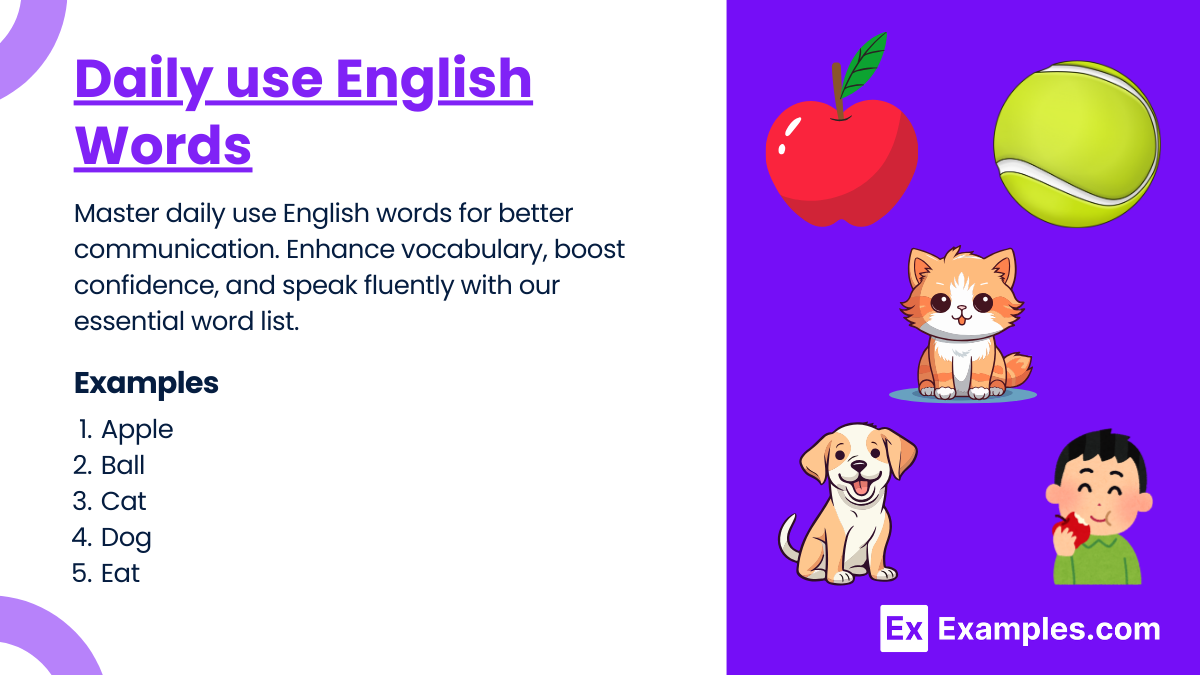450+ Daily Use English Words List, Meaning, PDF
Mastering daily use English words is essential for effective communication, whether you’re a student, a professional, or a casual learner. This article provides a curated list of common English words that are indispensable for everyday conversations. By familiarizing yourself with these words, you’ll enhance your vocabulary, boost your confidence, and improve your ability to express yourself clearly and efficiently. Dive into our comprehensive guide to start speaking English more fluently today!
Most Commonly Daily Use English Words - PDF
What are Daily use English Words?
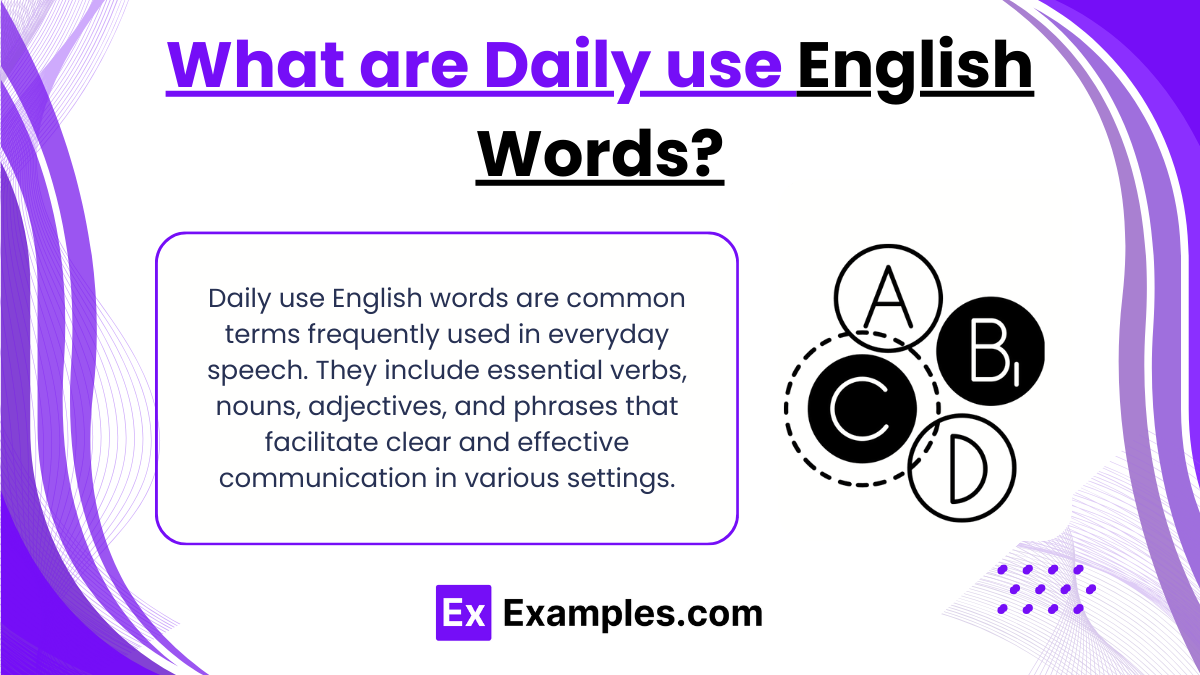
300 Most Commonly Daily use English Words
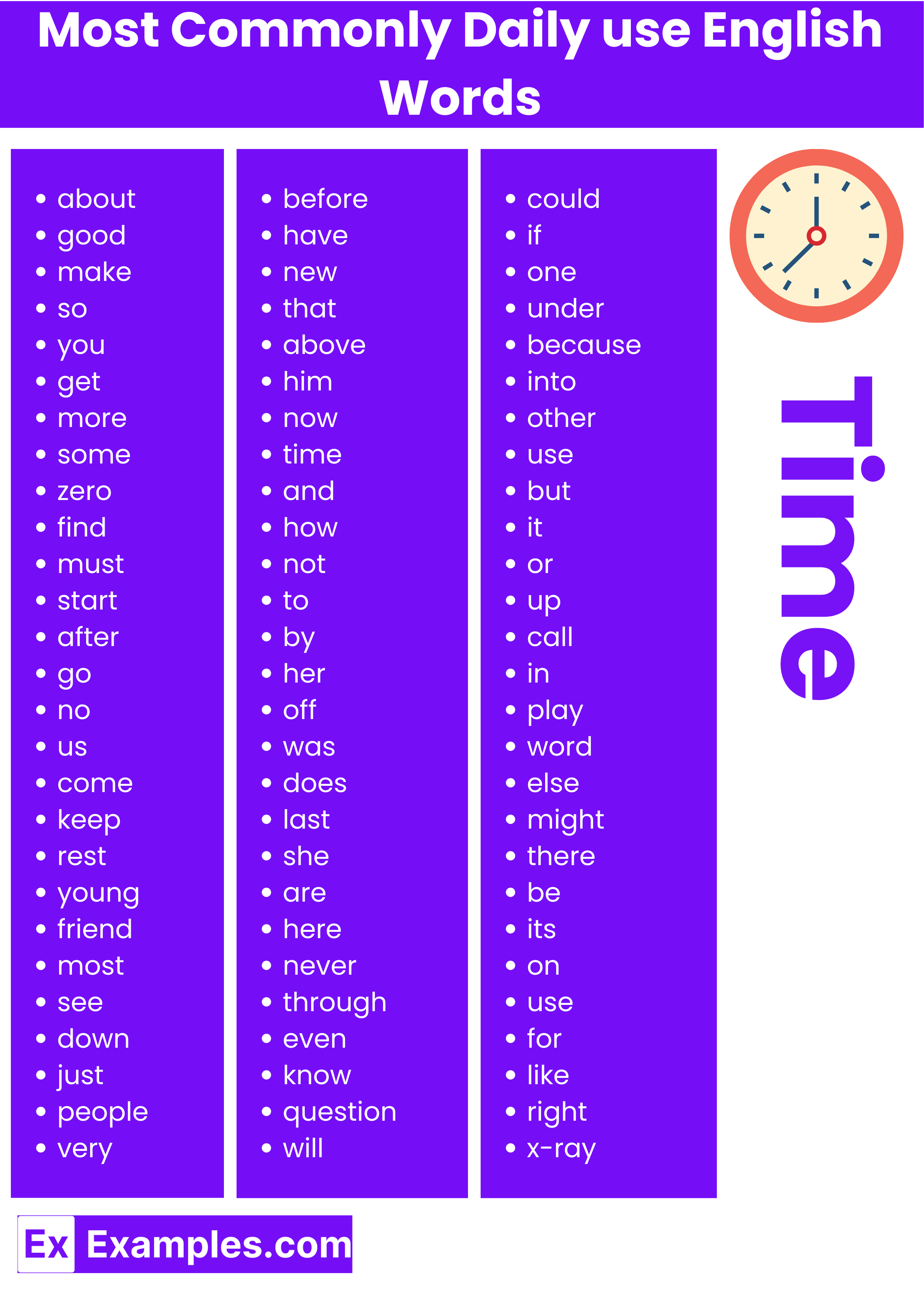
| about | before | could | down | even | for |
| good | have | if | just | know | like |
| make | new | one | people | question | right |
| so | that | under | very | will | x-ray |
| you | above | because | day | each | from |
| get | him | into | job | keep | long |
| more | now | other | place | quite | really |
| some | time | use | visit | want | yes |
| zero | and | but | can | do | every |
| find | how | it | jump | kind | look |
| must | not | or | please | quick | read |
| start | to | up | with | work | your |
| after | by | call | did | end | first |
| go | her | in | joke | let | many |
| no | off | play | run | say | take |
| us | was | word | yet | all | back |
| come | does | else | give | his | is |
| keep | last | might | number | open | put |
| rest | she | there | until | what | when |
| young | are | be | car | dear | every |
| friend | here | its | join | know | little |
| most | never | on | part | quite | right |
| see | through | use | way | would | zone |
Daily Use English Words for Children
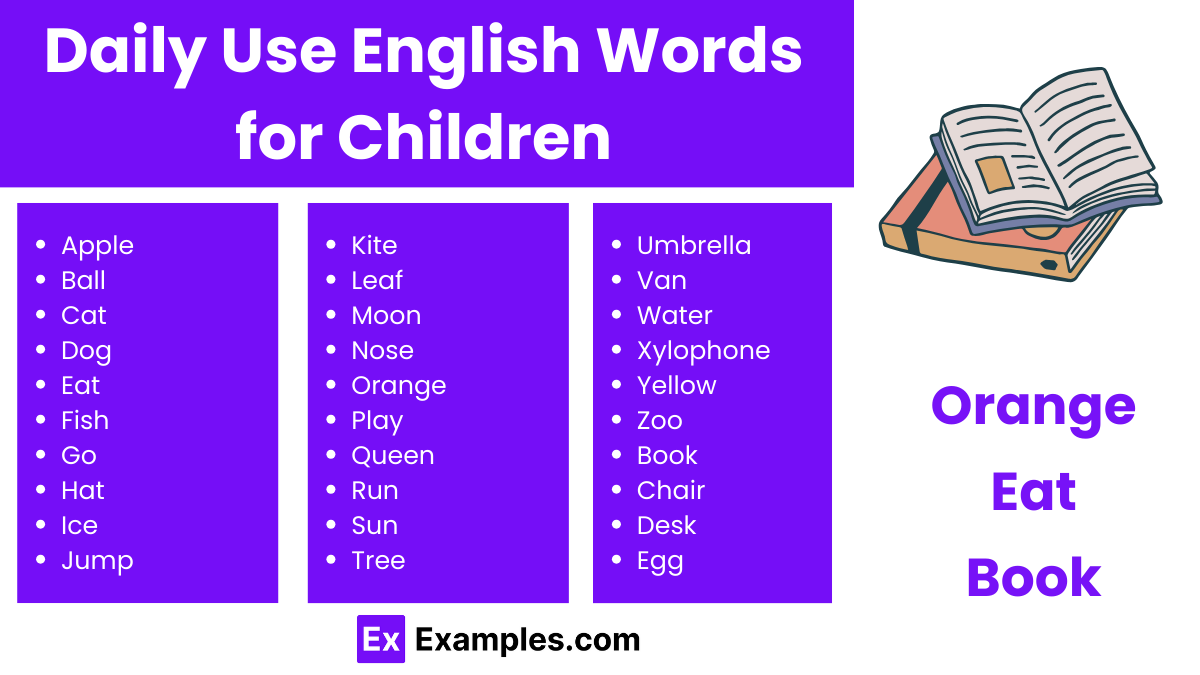
Equipping children with a strong foundation in daily use English words fosters early language development, enhances communication skills, and builds confidence. This curated list of words is designed to be both educational and engaging, offering young learners a starting point to express their thoughts, feelings, and needs effectively. By incorporating these words into their vocabulary, children can navigate conversations with ease and curiosity, laying the groundwork for lifelong learning and linguistic proficiency.
- Apple – A round fruit with red, green, or yellow skin.
- Ball – A round object used in games and sports.
- Cat – A small, domesticated mammal with fur, whiskers, and a long tail.
- Dog – A domesticated carnivorous mammal with four legs, fur, and a bark.
- Eat – To consume food.
- Fish – An aquatic animal with gills and fins.
- Go – To move or proceed.
- Hat – A head covering worn for various reasons, including protection from weather.
- Ice – Frozen water, cold and solid.
- Jump – To push oneself off the ground using the legs.
- Kite – A lightweight frame covered with paper or cloth, designed to fly in the wind.
- Leaf – A flat, green part of a plant or tree.
- Moon – The natural satellite of Earth, visible at night.
- Nose – The part of the face that senses smell and is used for breathing.
- Orange – A citrus fruit with a tough skin and juicy interior.
- Play – To engage in activities for enjoyment and recreation.
- Queen – A female ruler or the wife of a king.
- Run – To move at a speed faster than a walk.
- Sun – The star at the center of the solar system, providing light and heat.
- Tree – A tall plant with a trunk, branches, and leaves.
- Umbrella – A device with a canopy, used for protection against rain or sun.
- Van – A large vehicle used for transporting goods or people.
- Water – A clear, colorless, odorless, and tasteless liquid.
- Xylophone – A musical instrument with wooden bars that produce sounds when struck.
- Yellow – The color between green and orange in the spectrum.
- Zoo – A place where animals are kept for public viewing.
- Book – A written or printed work consisting of pages.
- Chair – A piece of furniture for sitting.
- Desk – A table used for writing or working.
- Egg – An oval or round object laid by a female bird, reptile, fish, or invertebrate
Daily Use English Speaking Words
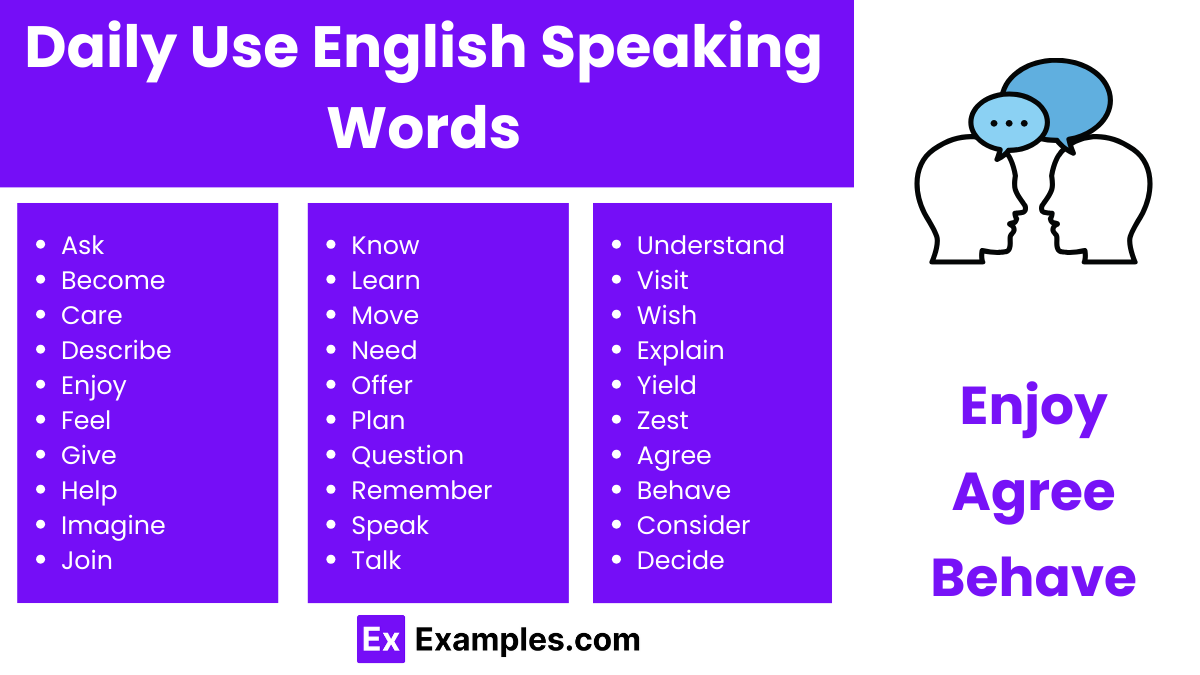
Elevate your English speaking skills with our handpicked selection of daily use words. This essential compilation is tailored to enhance your everyday communication, making you more articulate and confident. From casual chats to professional dialogues, these words are your key to a smoother and more effective language experience. Immerse yourself in this rich collection, designed to broaden your vocabulary and enrich your conversations.
- Ask – To request information or inquire about something.
- Become – To come to be or turn into.
- Care – To feel concern or interest.
- Describe – To give an account of in words.
- Enjoy – To take delight or pleasure in.
- Feel – To experience an emotion or sensation.
- Give – To freely transfer the possession of something to someone.
- Help – To provide assistance or support.
- Imagine – To form a mental image or concept of something.
- Join – To connect or become part of something.
- Know – To be aware of through observation, inquiry, or information.
- Learn – To acquire knowledge or skill by studying, practicing, or being taught.
- Move – To change position or go from one place to another.
- Need – To require something because it is essential or very important.
- Offer – To present or proffer something for someone to accept or reject.
- Plan – To design or decide on a course of action.
- Question – To ask something in order to gain information.
- Remember – To have in one’s mind an awareness of something that one has seen, known, or experienced in the past.
- Speak – To say something in order to convey information, an opinion, or a feeling.
- Talk – To communicate or express oneself through spoken language.
- Understand – To grasp the meaning, significance, or nature of something.
- Visit – To go to see someone or somewhere, either socially or professionally.
- Wish – To feel or express a strong desire or hope for something that is not easily attainable.
- Explain – To make clear or understandable.
- Yield – To produce or provide (a natural, agricultural, or industrial product).
- Zest – Great enthusiasm and energy.
- Agree – To have the same opinion about something; concur.
- Behave – To act in a particular way.
- Consider – To think carefully about (something), typically before making a decision.
- Decide – To make a choice or determination from a number of alternatives
Daily Use English Vocabulary Words
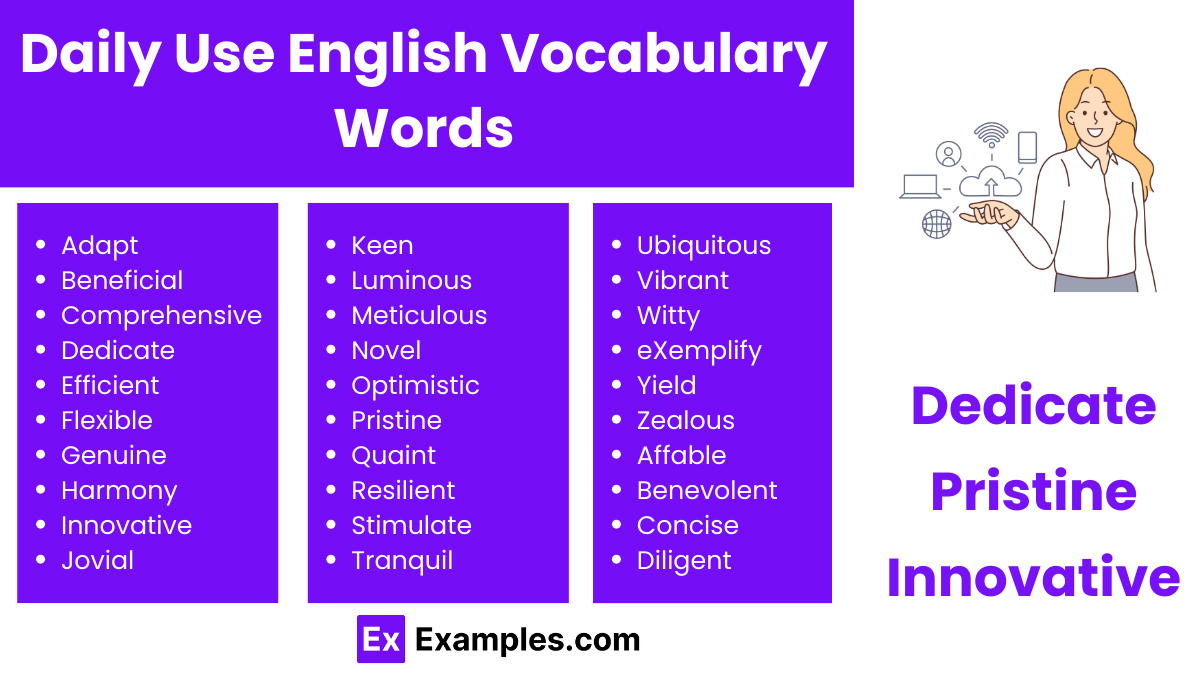
Expanding your English vocabulary is vital for effective communication, enhancing comprehension, and enriching conversations. Daily use of diverse vocabulary words not only boosts your confidence in language proficiency but also empowers you to express yourself more accurately and creatively. Incorporating a variety of words into your daily conversations and writings can significantly improve your linguistic skills, making you a better speaker, writer, and listener. By learning and using these words regularly, you can effectively convey your thoughts and emotions, engage in deeper discussions, and grasp complex ideas more easily.
- Adapt – to adjust or modify something to suit a new condition.
- Beneficial – producing good or helpful results; advantageous.
- Comprehensive – covering or including everything; thorough.
- Dedicate – to devote time, effort, or oneself to a particular task or purpose.
- Efficient – achieving maximum productivity with minimum wasted effort or expense.
- Flexible – capable of bending easily without breaking; willing to change or compromise.
- Genuine – truly what something is said to be; authentic.
- Harmony – the combination of different musical notes to produce a pleasing effect; agreement or concord.
- Innovative – featuring new methods; advanced and original.
- Jovial – cheerful and friendly.
- Keen – having a sharp edge or point; highly developed.
- Luminous – bright or shining, especially in the dark.
- Meticulous – showing great attention to detail; very careful and precise.
- Novel – new or unusual in an interesting way.
- Optimistic – hopeful and confident about the future.
- Pristine – in its original condition; unspoiled.
- Quaint – attractively unusual or old-fashioned.
- Resilient – able to withstand or recover quickly from difficult conditions.
- Stimulate – encourage or arouse interest or enthusiasm.
- Tranquil – free from disturbance; calm.
- Ubiquitous – present, appearing, or found everywhere.
- Vibrant – full of energy and enthusiasm.
- Witty – showing or characterized by quick and inventive verbal humor.
- eXemplify – to be a typical example of.
- Yield – produce or provide (a natural, agricultural, or industrial product).
- Zealous – having or showing zeal; passionate.
- Affable – friendly, good-natured, or easy to talk to.
- Benevolent – well meaning and kindly.
- Concise – giving a lot of information clearly and in a few words; brief but comprehensive.
- Diligent – having or showing care and conscientiousness in one’s work or duties.
New Daily Use English Words
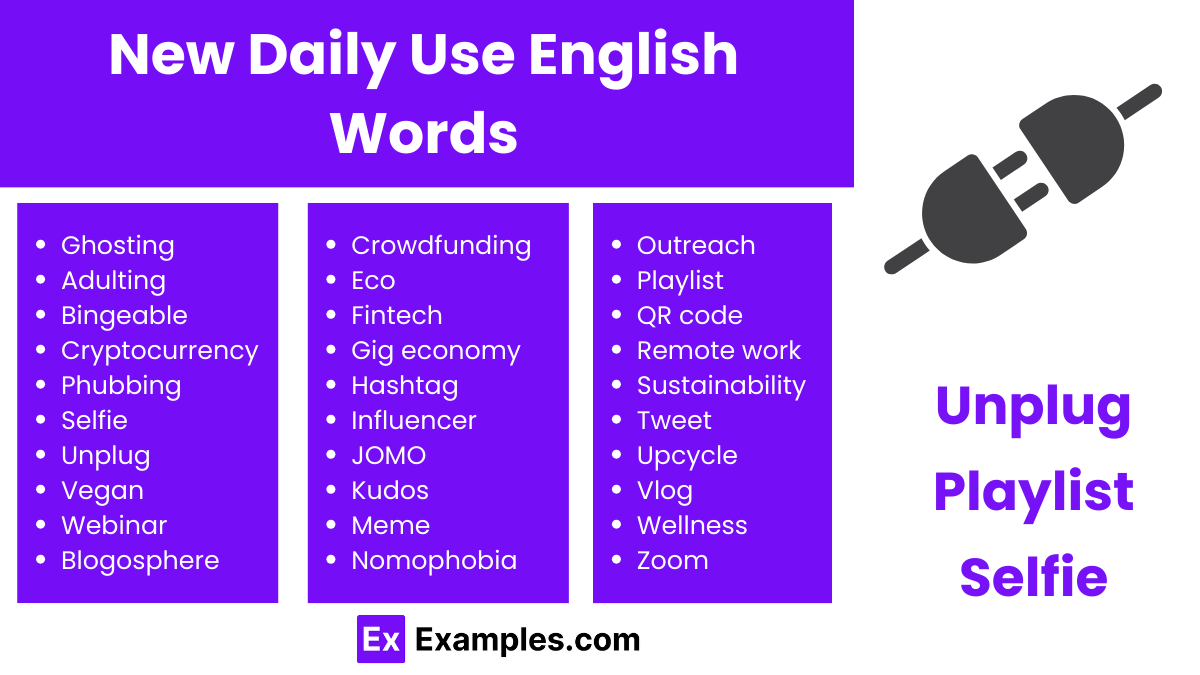
In the dynamic landscape of the English language, new words are constantly emerging, reflecting changes in culture, technology, and society. Embracing these new additions can significantly enhance your vocabulary, making your communication more relevant and engaging. This curated list of 30 new daily use English words, complete with meanings, is designed to enrich your linguistic repertoire. Dive into these fresh expressions to stay ahead in your verbal and written interactions, ensuring you’re always at the forefront of contemporary English usage.
- Ghosting – Suddenly stopping all communication with someone without explanation.
- Adulting – Performing tasks or duties associated with adulthood.
- Bingeable – Capable of being watched in rapid succession, usually referring to TV series.
- Cryptocurrency – Digital or virtual currency secured by cryptography.
- Phubbing – Snubbing someone in favor of a mobile phone.
- Selfie – A photograph that one has taken of oneself, typically with a smartphone.
- Unplug – To disconnect from digital devices for a period.
- Vegan – A person who does not eat or use animal products.
- Webinar – A seminar conducted over the Internet.
- Blogosphere – The online community of bloggers and blogs.
- Crowdfunding – Funding a project or venture by raising money from a large number of people.
- Eco-friendly – Not harmful to the environment.
- Fintech – Financial technology.
- Gig economy – A labor market characterized by short-term contracts or freelance work.
- Hashtag – A word or phrase preceded by a hash sign (#), used on social media.
- Influencer – Someone who has the power to affect the purchasing decisions of others because of their authority, knowledge, position, or relationship with their audience.
- JOMO – Joy of Missing Out; pleasure in taking a break from social activity.
- Kudos – Praise and honor received for an achievement.
- Meme – A humorous image, video, piece of text, etc., that is copied and spread rapidly by Internet users.
- Nomophobia – Fear of being without one’s mobile phone.
- Outreach – The act of extending services or assistance beyond current or usual limits.
- Playlist – A list of songs or pieces of music to be played.
- QR code – A machine-readable code used for storing URLs or other information for reading by the camera on a smartphone.
- Remote work – Work that is done outside of a traditional office environment.
- Sustainability – Avoidance of the depletion of natural resources to maintain ecological balance.
- Tweet – A post made on the social media platform Twitter.
- Upcycle – Reuse discarded objects or material in such a way as to create a product of higher quality or value than the original.
- Vlog – A blog in which the postings are primarily in video form.
- Wellness – The state of being in good health, especially as an actively pursued goal.
- Zoom – To have an online video conference meeting via the Zoom platform
Examples of Daily English Words Used in School
- Assign: To give a task or duty.
- Review: To go over or examine material that has been previously covered.
- Solve: To find an answer to a problem or equation.
- Present: To show or demonstrate something to a group.
- Calculate: To determine mathematically the amount or number of something.
- Organize: To arrange or put in order.
- Research: To study materials and sources to establish facts and reach new conclusions.
- Sketch: To make a rough drawing to explain or assist in understanding something.
- Recite: To repeat aloud from memory before an audience.
- Compare: To examine two or more items to discover similarities and differences
Examples of Daily English Words Used in Sentences
- Assign: “The teacher will assign a new project next week.” – The teacher will give us a new project to work on starting next week.
- Review: “Let’s review the notes from yesterday’s class.” – We should go over the material we covered in class yesterday.
- Solve: “Solve this math problem before the end of the period.” – Find the answer to this math problem before the class ends.
- Present: “You will present your science project to the class tomorrow.” – You need to show and explain your science project to everyone in class tomorrow.
- Calculate: “Calculate the total cost for all the books you need.” – Use math to figure out how much all the books will cost together.
- Organize: “Organize your desk to find your lost pen.” – Arrange your desk neatly so you can find your missing pen.
- Research: “Research the history of the American Civil War for your report.” – Look up information and facts about the American Civil War to write your report.
- Sketch: “Sketch the diagram on the board to help explain your idea.” – Draw a simple picture on the board to make your idea easier to understand.
- Recite: “Recite the poem you memorized for the class.” – Say the poem you learned by heart out loud in front of the class.
- Compare: “Compare the two poems and write about their themes.” – Look at the two poems, find what is similar and different, and write about their main ideas.
FAQs
Why is learning daily use English words important?
Learning these words improves communication, enhances vocabulary, boosts confidence, and makes conversations in both casual and formal settings easier and more effective.
How can I learn daily use English words quickly?
Practice regularly, read books, watch English content, use flashcards, and engage in conversations to reinforce and remember commonly used words easily.
Can daily use English words improve my fluency?
Yes, mastering daily use words helps in forming sentences naturally, reducing hesitation, and making conversations smoother and more confident.
What are some examples of daily use English words?
Common examples include eat, speak, walk, read, write, listen, answer, ask, explain, and understand, which are frequently used in daily conversations.
Where can I practice daily use English words?
You can practice by speaking with friends, reading books, using language apps, watching English videos, and writing short sentences daily.



